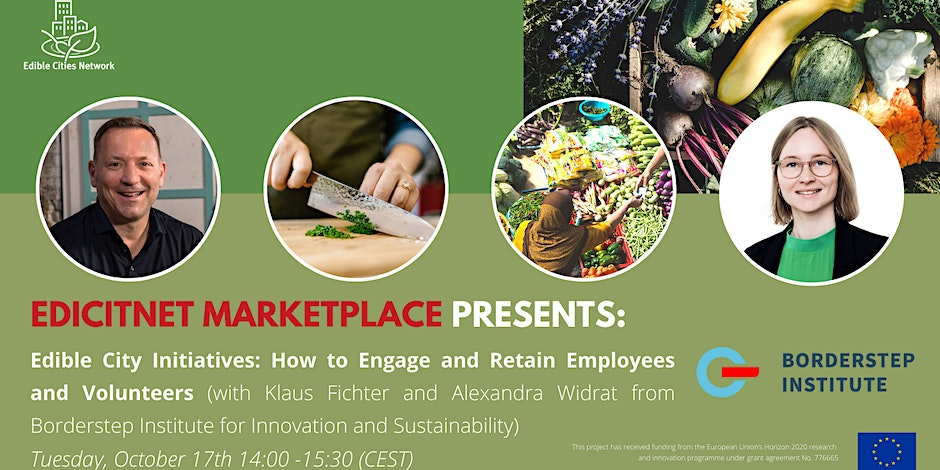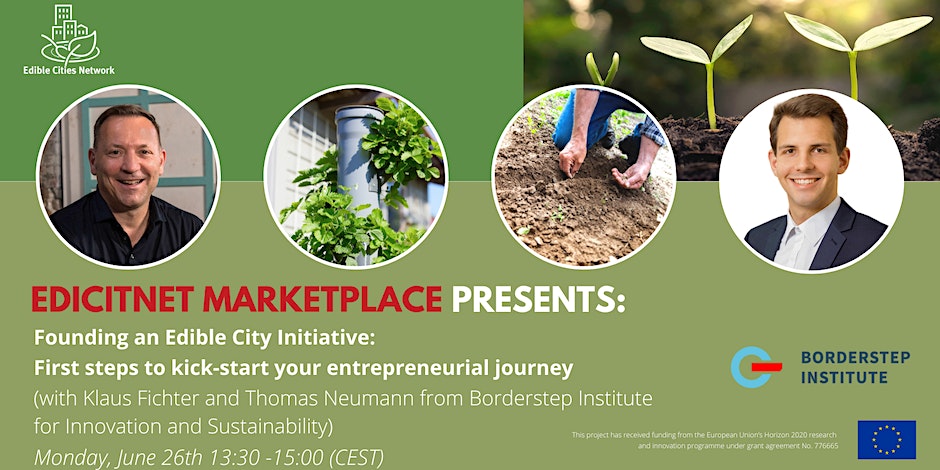Marketplace Events
Past Events

EdiCitNet Marketplace Workshop (ENG)
Edible City Initiatives: How to Engage and Retain Employees and Volunteers
17 October 2023 I 14:00 – 15:30
A good team creates the foundation needed to build a successful edible city initiative or business. Finding the right people, whether employees or volunteers, and engaging them are important considerations. In this workshop, participants learnt about strategies of recruiting, engaging and retaining employees as well as volunteers.
In the interactive session, participants were guided to work out their employer value proposition and explore what their initiative stands for and makes it unique. Participants had the chance to discuss what they have developed and identify necessary next steps to communicate their employer value proposition, together with the Borderstep Institute as well as like-minded individuals from the edible city community.
This event was designed for emerging and established urban food initiatives.
Agenda
14:00 – 14:05 pm
Welcome & Introduction: The Edible Cities Network – The Global Movement for Food Innovation in Cities
Dr. Ina Säumel, EdiCitNet project lead & head of the research group Multifunctional Landscapes at IRI THESys, Humboldt-Universität zu Berlin
14:05 – 14:20 pm
Input & Inspiration: Employee & Volunteer Management Strategies
Prof. Dr. Klaus Fichter, Alexandra Widrat, Borderstep Institute for Innovation and Sustainability
14:20 – 15:20 pm
Interactive Session: Develop your Employer Value Proposition (EVP)
15:20 – 15:30 pm
Closing Round: Discussion of Results and Outlook

EdiCitNet Marketplace Workshop (ENG)
The Edible Cities Network: Sustainable Entrepreneurship Workshop
26 June 2023
Do you want to develop a solution for supporting sustainable food production and consumption in your city? In this workshop, participants gained insights into the most important first steps to take as an aspiring edible city entrepreneur. Next to receiving introductory information on sustainable business model development with the Edible City Solution Canvas, participants took inspiration from good-practice examples of successful edible city solutions and business models.
The interactive session was designed to help participants focus on the essential elements to get started and work out their vision, sustainable value proposition and define their customers or target groups. In small groups, they were guided to explore their strengths, values, and goals – the foundation of any entrepreneurial endeavour. They then had the chance to discuss and verify what they developed in the interactive session and identify necessary next steps on their entrepreneurial journey, together with the sustainable business experts from the Borderstep Institute as well as like-minded individuals from the edible city community.
Agenda
13:30-13:35 pm
Welcome & Introduction: Edible Cities Network – The global movement for food innovation in cities
Dr Ina Säumel, EdiCitNet project lead and head of the research group Multifunctional Landscapes at the Integrative Research Institute on Transformations of Human-Environment Systems at Humboldt University Berlin
13:35-13:50 pm
Input & Inspiration: How to develop innovative edible city solution models – First steps & good practices
Prof. Dr. Klaus Fichter, Alexandra Widrat, Borderstep Institute for Innovation and Sustainability
13:50-14:40 pm
Interactive Session: Define your vision, sustainable value proposition and targets groups, using the Edible City Solution Canvas
14:40-15:00pm
Closing Round: Discussion of results and joint definition of next steps

EdiCitNet Marketplace Workshop (ENG)
Measure and Manage the Impact of Your Edible City Initiative
19 October 2022
Measuring and managing impact is a fundamental part of running a sustainable urban food initiative, no matter what type of service or product you are offering. This Marketplace workshop offered participants an insight into how to get started with the seemingly daunting task of impact measurement and management.
Is our urban food initiative creating measurable value for our target groups? What impact are we creating for society, economy and the environment? And how can we substantially improve positive effects over time? With a sound impact management system in place, your initiative will ultimately be able to gain insights into these and other questions. In the long term, it will provide you with a multitude of benefits – from resource savings to more key stakeholders involved in your initiative and better management of your social, environmental and economic value, just to name a few.
In this workshop, hosted by the Edible Cities Network, Prof Dr Klaus Fichter from Borderstep Institute for Innovation and Sustainability, together with Alexander Schabel from ImpactNexus, introduced key concepts and practical aspects of impact measurement and management in the context of urban agriculture. Participants got the opportunity to understand how to define key impact goals, how to design a theory of change and how to determine feasible indicators.

EdiCitNet Marketplace Webinar (ENG)
The Diamond Model: Analysing & Strategising for Strong, Stable & Thriving Urban Food Initiatives
25 May 2022
Are you part of an NGO, small business or organisation working with food, sustainability and cities? Are you looking to set goals for your organisation, assess your values and strategise for success? Do you want ideas for how to let the world know about all the great things you’re doing?
In this webinar, hosted by the Edible Cities Network, Alice Bischof from Wageningen University introduced participants to a brand new tool that helps you gain a new perspective on your urban food initiative, identify its core values and develop strategies that will ensure it stays strong, stable and thriving long into the future: the Diamond Model.
Developed by Alice Bischof, the Diamond Model can also help you communicate effectively about how, why and to whom your organisation makes a difference. Similar to the Business Model Canvas, the Diamond Model supports business model innovation and strategising. But it’s not just for profit-oriented organisations – it can be used to support all types, including NGOs, NPOs and associations too.
If you prioritise social and/or ecological goals over commercial success, this tool is for you! And if you want to include commercial value streams into your initiative, the model covers them as well.
Want to read more about the Diamond Model? Check out our guide to the tool right here.

EdiCitNet Marketplace Workshop (DE)
Die besten Plätze in der essbaren Stadt: Welche Fläche passt zu meinem Konzept?
11 May 2022
Immer mehr Menschen produzieren, verkaufen und verteilen Nahrung in der Stadt und stärken somit den sozialen Zusammenhalt sowie lokale Ökosysteme. In vielen Städten weltweit wurden bereits Konzepte der “essbaren Stadt” erfolgreich umgesetzt. Dieser vom Edible Cities Network organisierte Workshop widmete sich einer der wichtigsten Herausforderungen in diesem Bereich: dem Thema der Flächen.
Programm:
15:00 Uhr: Begrüßung
15:15 Uhr: Wichtiges zum Thema urbane/nutzbare Dächer (Felix Mollenhauer, Bundesverband Gebäudegrün)
15:30 Uhr: Informationen zu Stadtgärten und anderen urbanen Flächen (Anneli Sofia Karlsson, Stadtverwaltung Andernach)
15:45 Uhr: Interaktive Breakout-Sessions (Miro, mit Experte von Nolde & Partner zu Fragen zum Thema Wasser)
16:15 Uhr: Fazit und Ausblick
16:30 Uhr: Ende der Veranstaltung

EdiCitNet Marketplace Workshop Series (ENG)
Oslo: Finding Sustainable Economic Models in Urban Agriculture
30 September – 11 November 2021
Organised by the Edible Cities Network, Nabolagshager, in collaboration with the Municipality of Oslo: Agency for Urban Environment (Bymiljøetaten), offered a free workshop series to help urban food businesses further develop their financial sustainability models.
The interactive workshops, developed and implemented by leaders in the field from across Europe, provided participants with tools, resources, and networking in order to strengthen their organisations and projects. Through both digital and in-person workshops, held at Linderud Gård in Oslo, the Edible Cities Network provided professional training on relevant topics to successfully grow and improve urban food businesses.
Workshop 1 – Identifying and communicating your value (30 September 2021) Agenda
Workshop 2 – Enhancing customer relations and strategic partnerships (21 October 2021) Agenda
Workshop 3 – Focusing activities and resources for financial sustainability (11 November 2021) Agenda
![Essbare Stadt2[8907]-min Essbare Stadt](http://i1.wp.com/edicitnet.com/wp-content/uploads/Essbare-Stadt28907-min.jpg)
EdiCitNet Marketplace Workshop (DE)
Die essbare Stadt: Initiativen und Gründungsteams erfolgreich in der Region etablieren (Fokus Koblenz/Andernach)
23 June 2021
Immer mehr Menschen produzieren, verkaufen und verteilen Nahrung in der Stadt und stärken somit den sozialen Zusammenhalt sowie lokale Ökosysteme. Auch in Städten wie Koblenz, Andernach und weltweit wurden bereits viele Konzepte der “essbaren Stadt” erfolgreich umgesetzt. In diesem Workshop wurden diese urbanen Akteure virtuell miteinander vernetzt und neue Möglichkeiten der Entwicklung aufgezeigt.
Gerade in Zeiten der Pandemie hat sich herausgestellt wie wichtig regionale und lokale Netzwerke und Märkte sind, um resilient zu sein, wenn globale Krisen die internationalen Märkte erschüttern. Hinter dem Konzept des Business Consultings für die Lösungen der essbaren Stadt steht also deren Stabilisierung sowie Förderung, um die eigene Region/Stadt wirtschaftlich nachhaltig zu gestalten.
Programm:
12:30 Uhr: Begrüßung und interaktive Vernetzung
In Kleingruppen wurden alle teilnehmenden Initiativen, Start-ups und Akteur*innen entlang der Wertschöpfungskette der essbaren Stadt platziert und somit eine gewinnbringende Vernetzung ermöglicht.
13:15 Uhr: Übersicht Finanzierungsmöglichkeiten für ECS
Alexander Schabel vom Borderstep Institut stellte verschiedene Formen der Finanzierung für Start-ups und Initiativen der essbaren Stadt vor.
14:00 Uhr: Kooperation mit der Stadt / der öffentlichen Administration
Ein Vertreter der Stadt Koblenz skizzierte Kooperationsmöglichkeiten und diskutierte mit den Teilnehmerinnen und Teilnehmern, wie die Zusammenarbeit mit lokalen Behörden und öffentlichen Institutionen erfolgreich gestaltet werden kann.
15:30 Uhr: Ende der Veranstaltung

EdiCitNet Marketplace Workshop (DE)
Die essbare Stadt: Finanzierungsmodelle und strategische Entscheidungsträger in deiner Stadt (Fokus Berlin)
15 June 2021
Immer mehr Menschen produzieren, verkaufen und verteilen Nahrung in der Stadt und stärken somit den sozialen Zusammenhalt sowie lokale Ökosysteme. Auch in Städten wie Berlin und weltweit wurden bereits viele Konzepte der “essbaren Stadt” erfolgreich umgesetzt. In diesem Workshop wurden diese urbanen Akteure virtuell miteinander vernetzt und neue Möglichkeiten der Entwicklung aufgezeigt.
Gerade in Zeiten der Pandemie hat sich herausgestellt wie wichtig regionale und lokale Netzwerke und Märkte sind, um resilient zu sein, wenn globale Krisen die internationalen Märkte erschüttern. Hinter dem Konzept des Business Consultings für die Lösungen der essbaren Stadt steht also deren Stabilisierung sowie Förderung, um die eigene Region/Stadt wirtschaftlich nachhaltig zu gestalten.
Programm:
12:30 Uhr: Begrüßung und interaktive Vernetzung
In Kleingruppen wurden alle teilnehmenden Initiativen, Start-ups und Akteur*innen entlang der Wertschöpfungskette der essbaren Stadt platziert und somit eine gewinnbringende Vernetzung ermöglicht.
13:15 Uhr: Übersicht Finanzierungsmöglichkeiten für ECS
Alexander Schabel vom Borderstep Institut stellte verschiedene Formen der Finanzierung für Start-ups und Initiativen der essbaren Stadt vor.
13:30 Uhr: Expert Session Finanzierung mit CrowdDesk
Niklas Marx von der Crowdfunding-Plattform CrowdDesk referierte über die Möglichkeiten dieser Finanzierungsform und stellte erfolgreiche Kampagnen vor.
14:15 Uhr: Expert Session mit der Berliner Senatsverwaltung für Wirtschaft, Energie und Betriebe
Norbert Herrmann und Helen Franke skizzierten Kooperationsmöglichkeiten und diskutierten mit den Teilnehmerinnen und Teilnehmern, wie die Zusammenarbeit mit lokalen Behörden und öffentlichen Institutionen erfolgreich gestaltet werden kann.
15:30 Uhr: Ende der Veranstaltung

EdiCitNet Marketplace Workshop
Growing Jobs in Urban Agriculture
23 October 2020
On October 23rd 2020, Nabolagshager gathered practitioners, business developers, students and aspiring entrepreneurs in an online interactive workshop space. The purpose of organising this event was our increasing awareness of the challenges that those starting businesses in urban agriculture face: the need to develop economically sustainable models that are tailored to their community’s needs and their customers’ desires.
The conference was made possible thanks to the support of the County Governor of Oslo and Viken. This workshop provided a space to share some of what we have learned, while also collecting more data on challenges. The aim of the workshop was to equip the participants with a better understanding of the hurdles of ECS and how to overcome them to achieve sustainable impact. The event consisted of 8 modules of 30 minutes, a 15-minute long knowledge transfer session followed by a 15-minute long workshop session among participants.
Participants gathered in a small group with a facilitator exploring a real-world urban agriculture business as a case study. The workshops intended to apply the take-aways from the talk to the case, therefore a digital whiteboard facilitating individual reflection and group work on activities was prepared.


